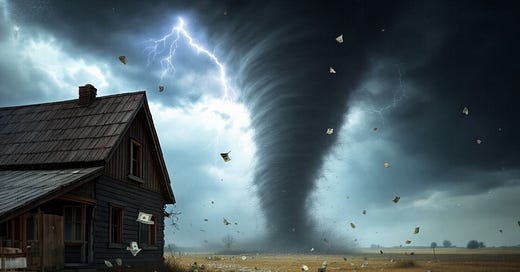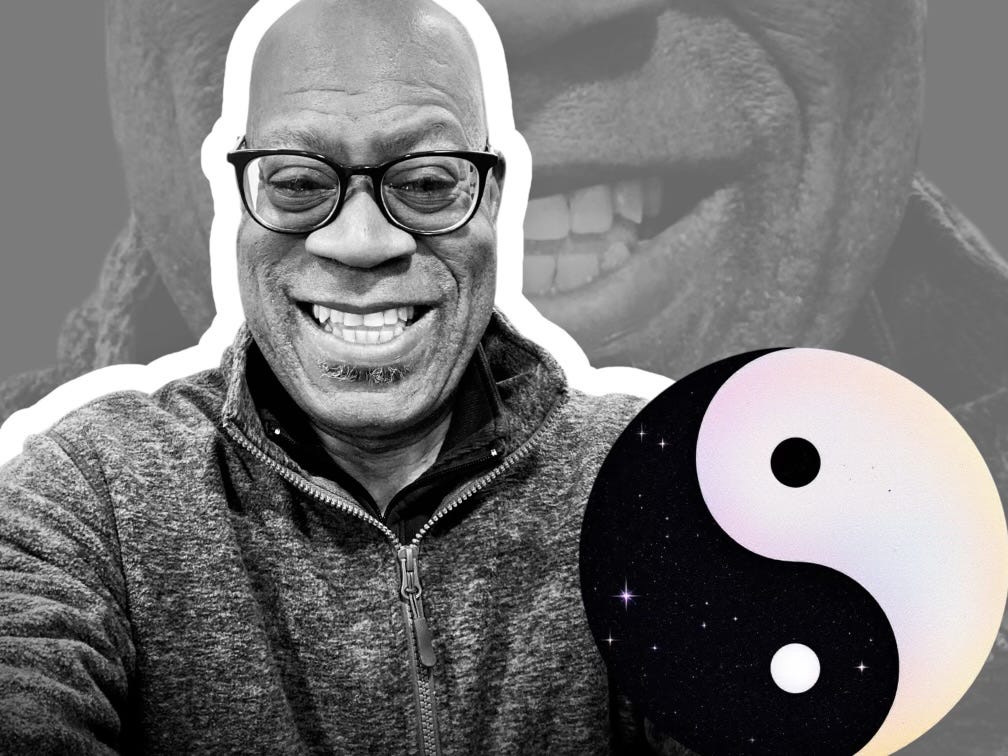There’s a storm brewing over the American economic heartland—not of wind or rain, but of tariffs, trade wars, and retaliatory policies spinning with the velocity of a tornado.
In Taoist allegory, such phenomena are not merely political occurrences but are expressions of imbalance, of forcing the way rather than flowing with it. And in an eagerness of one man to “win” economically, we risk toppling the house we’ve built.
Recent U.S. tariffs aimed at foreign imports—from Chinese electric vehicles to European steel—are billed as protectionist measures, cloaked in nationalism and economic self-defense. Yet, much like trying to build a fence mid-tornado, these efforts often worsen the very disruption they seek to control.
As prices soar and global partners retaliate, inflation’s grip tightens on the everyday citizen. Thus this attempt at stabilization begins to destabilize.
Tornadoes as Metaphor for Imbalance
Tornadoes don’t arrive without cause. They form when opposing forces—warm, moist air and cold, dry currents—collide in turbulent disagreement.
The same with trade wars. In the geopolitical atmosphere, pride clashes with pragmatism, national interest with global interdependence. We forget that the economy, like nature, thrives not through control but through harmony and flow.
Tariffs, like levees hastily erected during a flood, give the illusion of security while redirecting destruction elsewhere. The cost of materials goes up. Supply chains fray. Small businesses, like fragile homes in the tornado’s path, are the first to be blown away.
Consumers—particularly those already living paycheck to paycheck—bear the brunt. Even those who cheer the storm at first may find themselves picking through the wreckage later.
The Taoist Way Through the Storm
In Tao Te Ching, Lao Tzu warns:
“The more prohibitions there are, the poorer the people become.The harder you try to control, the more you lose control.”
A tariff tornado is nothing if not a frantic act of control—an attempt to assert dominance in a world that resists coercion. But the Tao teaches that true power lies not in force, but in flexibility.
Bamboo bends in the wind and survives. On the other hand, the rigid oak snaps. Economic policy should follow the same principle—bend, respond, and align with the natural rhythm of interdependence.
What would a Tao-guided trade policy look like? One that fosters mutual benefit rather than zero-sum competition. One that seeks balance over victory. One that, rather than imposing artificial scarcity, trusts in the natural flow of innovation, demand, and cooperation.
Wisdom from the I Ching: Hexagram 6 – Conflict
The I Ching, or Book of Changes, offers further insight. Hexagram 6—Conflict—speaks to the dangers of contention. Its lesson is stark — confrontation is sometimes unavoidable, but resolution comes not through obstinance, but through wise retreat, measured engagement, and clarity of purpose. It warns that prolonged dispute leads to misfortune and that only the one who withdraws from battle can see the bigger picture.
In the current climate, that may mean stepping back from tariff escalation and investing in long-term strategies around education, domestic manufacturing innovation, and collaborative trade agreements that benefit more than just a select few. Not sexy, perhaps. But sustainable.
The Quiet Trump Card: Stillness and Strategy
To “trump” a tariff tornado is not to out-shout it but to outlast it. Not to unleash counter-winds but to wait for calm. As the Tao advises:
“Do you have the patience to wait until your mud settles and the water is clear?”
The real challenge isn’t China. It isn’t foreign cars or solar panels or soybeans. The challenge is our refusal to sit still, to listen, to align with what is rather than what we fear. Trade winds will always blow. But whether they become tornadoes—or gentle currents—is up to us.
By applying ancient wisdom to a modern crisis, we may discover that the greatest economic advantage lies not in dominance, but in discernment. Not in tariffs, but in the inner alchemy of the Tao.
If my daily Chocolate Taoist nomadic wisdom lights up your day, fuels your mind, or gives you a fresh perspective, then I’d love your support as a paid member!
Or, if you’re feeling generous, drop a little (or a lot) of dirty chai latte love my way—every bit helps keep this Taoist journey flowing.
I’m committed to delivering high-quality, thought-provoking features straight to your inbox—no paywalls, no fluff, just raw, unfiltered wisdom on what it means to be human in today’s paradoxical, mysterious, and uncertain world.
Your support fuels my full-time mission, and I appreciate every single contribution. Let’s keep this energy going!
NEW! Join and promote my new Chocolate Taoist “Nomadic Wisdom Journaling Program” HIGHLY RECOMMEND 💥






This piece glows with the kind of wisdom we desperately need more of—especially in a world that confuses control with competence. The metaphor of a tariff tornado is spot on: loud, forceful, but ultimately destabilizing. What moved me most was the reminder from the Tao Te Ching that stillness—not more movement—is often the truest power. In a time when every crisis demands immediate action, your call to discernment, flexibility, and harmony feels revolutionary. Thank you for reframing economic policy as a spiritual opportunity, not just a political decision.
What would a Taoist trade policy look like? Maybe non-interventionist, win-win, peaceful and respectful relationships between countries. It's reminding me of something...
Thanks for posting, Diamond-Michael.